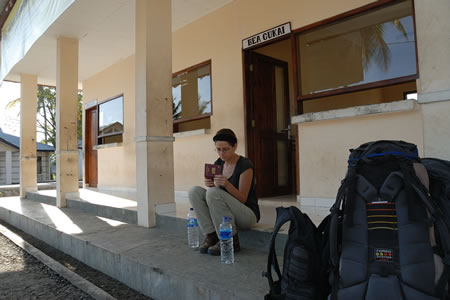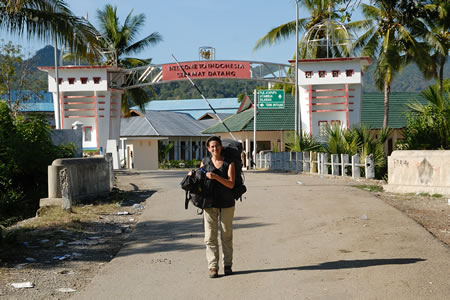

| Destination Timor-Leste | |
Dili (Timor-Leste), May 19th 2009 |
|
One of the countries high on our visit wish list for Southeast Asia is East Timor, preferably named Timor-Leste. This country is the youngest country in this region and gained its independence in 2002, after a long and bloody fight with occupier Indonesia. Many Timorese people lost their lives in the independence struggle. But also after independency, Timor-Leste had several periods of internal insurgency. Besides that, Timor-Leste has the doubtful honour to be the poorest country in Asia. But since a couple of years it is quiet again, but Timor-Leste did still not succeed to attract a vast number of travellers, despite the fact that the country has a lot to offer. The number of travellers that visit Timor-Leste on average on a daily basis can be counted on one hand. We travelled yesterday to the small town of Atambua in the eastern part of Indonesian West Timor, close to the border with Timor-Leste. Atambua is described in our travel guide as a city that can be best avoided. The city seems to be inhabited by a large number of pro-Jakarta Timorese people who did bad things in the independence struggle of Timor-Leste, and especially during the withdrawal of the Indonesian army at the end of it. Indonesia used the tactics of scorched earth, with means that they destroyed and murdered as much a possible during their withdrawal. Many Timorese people who collaborated with the Indonesian army found their way to Atambua to start a new life. Our travel guide writes that you must take into account some anti-western feelings while being in Atambua, which is especially directed towards Australians, because Australia is seen as one of the driving forced behind the independence of Timor-Leste. We spend the night in Atambua and strolled through the town for several hours, but did not experience any hostilities. On the contrary, the people were extreme friendly and helpful. In our opinion, there is absolutely no reason to avoid the town of Atambua. |
|
 |
|
Waiting at the border with Timor Leste till the immigration desk opens |
|
We got up this morning very early because we do not want to arrive too late in Dili, the capital city of Timor-Leste. Because of the presence of a huge UN-force and many NGO’s, it seems to be quite difficult to find a room for a normal price. At 06.30 in the morning, we take an ojek (motorcycle taxi) for the thirty minutes drive to the small village of Motoain at the border with Timor-Leste. The ride is beautiful and takes us through forested hills and small villages. The school kids are already on their way to school, but still take the time to wave and yell to us. “Hello Mister” and “Hello Miss” is what we hear when we drive with our motorcycle through the villages. Also the older villagers start smiling when they see two “Booleh’s” (Indonesian for ‘white skins’) with big backpacks uncomfortable on the back of a motorcycle. At a little bit past seven we arrive at the desolated border crossing. The border crossing is also a small military base, but if we look at the activities that are going on, they do not expect a lot of border hostilities on the short term. We only see a couple of pigs and sheep and a cleaner who is mopping the immigration office. “The border opens at nine o’clock” is what he assures us. We take of our backpacks, sit down and see how the border crossing and military base comes alive slowly. After half an hour, two young Indonesian soldiers join us to practice their English. They are from the island of Lombok and are sent by the army to this remote border crossing for a year, far away from family and friends. We talk about all kind of things and at a little past eight, we are lucky. The immigration officer decided to open his immigration office a little bit earlier, so that we can proceed with our journey to Dili. We get the necessary stamps, shake hands with the soldiers and leave Indonesian territory. It is a three hundred meter walk to the border post of Timor-Lest. In between the border posts, money exchangers try to convince us to exchange Indonesian Rupiahs for American Dollars, which is also the official currency of Timor-Leste. At the immigration of Timor-Leste we fill in the necessary papers after which the visa is stamped in our passport. At first they wanted to give us only a visa for fourteen days, but after some whining, begging and telling them that fourteen days is absolutely not enough to see their beautiful country, they gave us thirty days. |
|
 |
|
Crossing the border on foot after all formalities |
|
| After the immigration formalities are finished, we have to walk to two officers in military uniforms who seem to be the customs officials. After taken the edge of the suggestion that we are journalists, we can enter the country without showing the contents of our backpacks. We walk into Timor-Leste and ask at some soft drink sellers where we can find the bus to Dili. They all point to the small village of Batugade, located two kilometres further on the road. In contrast with the Indonesian side of the border, there isn’t a lot of traffic, so we decide to walk the two kilometres to Batugade. It is already very hot and the sweat is flowing from all sides of our body, but the walk to Batugade is really nice. We pass small friendly settlements where people still live in reed houses. In Batugade people tell us to wait next to the main road to wait till a bus to Dili passes. Within two minutes after we took of our backpacks to take a rest, a bus shows up with the bus assistant hanging at the side of the bus, yelling: “Dili, Dili, Dili!”. He throws the backpacks on the roof of the bus and we take a seat on the last two available eats in the bus. We are on the way.
We are amazed to see that the bus first drives to the border crossing to drop some passengers. If we had known this, we could have waited at the border and enjoy a cold soft drink in anticipation of the bus. But after this short diversion, the bus starts driving in the direction of Dili. The journey is tiring and very slowly. The trip of a little bit more than a hundred kilometres takes more than four and a half hours. It feels like the bus is stopping every couple of minutes to pick up or drop passengers and their baggage. And with baggage, we do not mean just a backpack or a travel case. With baggage we mean bags of rice, boxes of oranges, piles of fire wood and sacks of vegetables. But the other bus passengers really don’t care because they know that one day, they will be next to the road themselves with their piles of baggage, hoping for a accommodating driver who wants to take them. But it is not only bad luck we have. After one hour of driving and stopping, the radio of the bus breaks down. Despite all efforts of the driver, including the licking of the tapes just before he puts them in the cassette player, they radio doesn’t start playing anymore, which eventually saves our eardrums. Dili, here we come! © copyright - Babakoto.eu / 2009 |
|